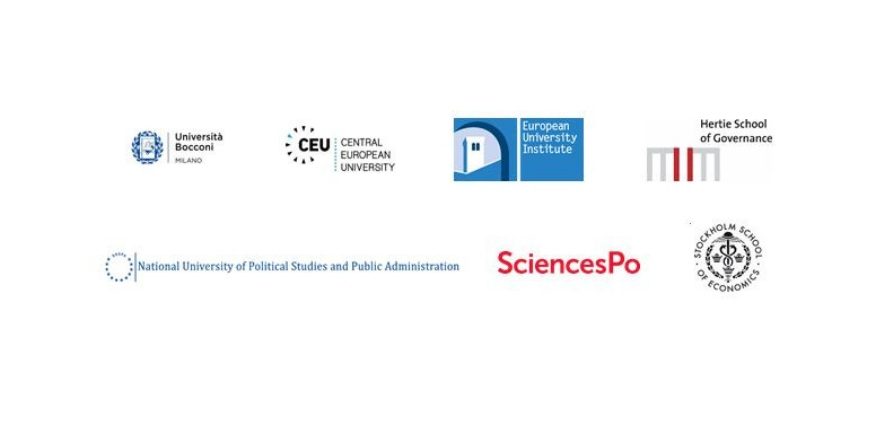Building on already strong existing ties, seven world-leading institutions decide to further unite to create the European University of Social Sciences. Through an alliance of both long- term strategic goals and joint concrete activities that will benefit students, faculty, staff and impact the broader public, CIVICA will prototype the university of tomorrow, it will generate innovative solutions to the world’s most pressing challenges inspired by the social sciences, and it will promote European civic values.
Bocconi University (Italy), Central European University (Hungary), the European University Institute (European Intergovernmental Organization), the Hertie School of Governance (Germany), the National University of Political Studies and Public Administration (Romania), Sciences Po (France) and the Stockholm School of Economics (Sweden) have submitted a joint application under the name “CIVICA – The European University of Social Sciences” to become one of the pilot European Universities in the first round of Erasmus+ applications in February 2019.
In a joint long-term mission statement, the seven Presidents recognize the special role of European social sciences in generating solutions to the world’s most pressing challenges. CIVICA embodies their ambition, as forward-thinking higher education institutions, to assume their civic responsibility as Europeans towards the future European generations and towards the role of Europe in the world:
“As world leading European institutions of social sciences, we are united in a unique mission: We want to educate the next generation of professionals who serve their societies across sectors, whose minds are concentrated on tackling the most pressing problems of the world, and who are driven by values of democracy, respect and civic resilience”.
CIVICA aims to unite leading European higher education institutions in the social sciences, the humanities, business management and public policy to form a broad European inter-university campus that links teaching and learning, research and innovation, and society at large across cultural, linguistic, and national borders. It will connect 38,000 students recruited from across Europe and all over the world to a community of 7,000 faculty members and some 3,000 administrative staff. CIVICA will also be joined by the London School of Economics as an Associated partner on many levels, and an ambitious set of activities will be dedicated to the international attractiveness and competitiveness of the alliance.
Being able to build upon decades of successful partnerships amongst many of the partners, and on the new complementarity sets of expertise that can be foreseen, the seven partners have a unique capacity to engage in long-term joint strategic goals as well as immediate concrete action, at all levels of their institutions. The more than 100-page long CIVICA project already provides the frame for prototyping and testing operational trans-European activities for the emergence of a European University. The proposal includes:
• The building of the physical and digital spaces and systems supporting a networked European Campus for learning, knowledge production and application;
• At the Bachelor level, a multi-campus, interdisciplinary bachelor’s education experience with a core focus on civic engagement;
• At the Masters level, a flagship multi-campus integrated course involving hundreds of students in team-work across Europe and dozens of faculty to respond to contemporary European and global challenges. Joint policy labs, incubators and capstone projects and hackathons with the same objective of combining education, research and innovation while also contributing to more European identity.
• At the Doctoral level, the emergence of an integrated European space for European Early Stage Researchers in the Social Sciences and Humanities based on a trans-European hub for mentoring and supervision
• Recognising the special role the social sciences must play in tackling global problems, four dedicated multi-campus knowledge creating teams will be created to conduct results-oriented
joint work and feed in the three levels of the European campus: Challenges to Democracy in the XXIst Century; Societies in Transition and Crises of Earth; Europe Revisited; and Data Driven Technologies for the Social Sciences.
• CIVICA is to be an active agent in European society. Trans-European actions for civic engagement and inclusion will include University for all Tours d’Europe, the promotion of access to higher education for all and the Open learning initiative for refugees and asylum seekers.
Through coordinated strategic planning, transformative governance and integrated activities, including embedded mobility at all levels, joint and flexible curricula, a networked approach to the students’ preparation for careers, civic commitment and hands-on societal outreach, CIVICA will contribute to the international competitiveness of the partners of the alliance and the European Higher Education Area and it will generate solutions to persistent European and world challenges. CIVICA – the European University of Social Sciences is certainly formed at a momentous time in European history; it shall strongly impact the future of Europe and the higher education sector globally.
Press contacts
• Bocconi University: Tomaso Eridani: tomaso.eridani@unibocconi.it
• Central European University: Ildiko Rull, rullI@ceu.edu
• The European University Institute: Marco Incerti: Marco.Incerti@eui.eu
• The Hertie School of Governance: Nikolas von Hoffmann: hoffmann@hertie-school.org
• National University of Political Studies and Public Administration: Anca Goga: anca.goga@snspa.ro
• Sciences Po (Main coordinator of CIVICA): Marie Frocrain: marie.frocrain@sciencespo.fr
• The Stockholm School of Economics: Hanna Flodmark: hanna.flodmark@hhs.se



